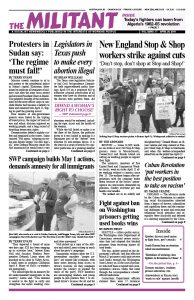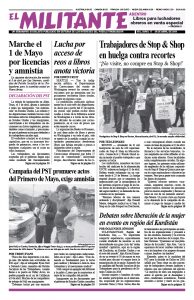CHICAGO — The advances made by the Cuban Revolution in combating racial discrimination inherited from a legacy of slavery, colonialism and capitalism there; and the continuing challenges to meet and overcome remaining racial prejudice and inequality were discussed and debated at a meeting organized by the Chicago Cuba Coalition here April 7.
About 35 people came to hear Gisela Arandia and Tomás Fernández Robaina. Arandia is the head of the Cuban chapter of ARAC, an organization of Afro-descendants of Latin America and the Caribbean. Fernández is a researcher at the José Martí National Library and professor at the University of Havana. Both belong to the Union of Artists and Writers of Cuba (UNEAC). The event was held at the hall of Service Employees International Union Healthcare Illinois.
“Racial ideas and divisions are not natural,” Arandia said in her opening remarks. “You can’t talk about race discrimination without discussing colonialism, and especially Africa, where people were forced into slavery in the most brutal conditions. When we analyze the roots of racial discrimination, colonialism and capitalism shaped it in Cuba.”
African slaves and their descendants were an integral part of the Cuban workers and peasants wars for independence from Spain, which unfolded between 1868 and 1898. “When the mambí army was on the point of winning independence, the United States showed up to ‘help,’” Arandia said with sarcasm. “The regime they imposed was prejudicial, especially towards the 60% of the soldiers and officers of the independence war who were Afro-descendants.” Racist laws, traditions from the U.S. Jim Crow system and capitalist superexploitation of Afro-Cubans were translated onto Cuban soil.
By 1959, when Cuban workers and farmers led by Fidel Castro and the July 26 Movement succeeded in overthrowing the U.S.-backed dictatorship of Fulgencio Batista, “there were segregated parks, beaches, everything,” said Fernández.
One of the first steps of the revolutionary government was to outlaw racial discrimination. Mobilizations such as the 1961 literacy campaign, in which 100,000 young people taught others to read and write across the country, especially benefited those who were most oppressed, including blacks and women.
“You started to have blacks working in places like banks, where they had been excluded before,” said Fernández. “But prejudice doesn’t just go away.” When he and others started to talk about the challenges that remain, “some people said that’s counterrevolutionary. But no, you have to be honest. We need to use the revolution in order to better our society.”
In response to a question about the police in Cuba, Fernández said, “Cuban society is very complex. Often police will ask only black people for their ID. I applaud the rappers. They began singing about this, making people more conscious of their rights as Cuban citizens.”
One Afro-Cuban man in the audience rose to challenge the speakers’ support for the revolution. “Cuba is a multiracial country, but all the decisions are made by white Cubans,” he said. “That’s the main reason I came here many years ago. The situation of black Cubans is almost the same as in slavery.”
“There’s no way you can say things aren’t different than before. That’s nonsense,” Arandia responded. “For example, there’s large numbers of black women in science — developing vaccines, working as doctors. That doesn’t exist anywhere else in the world.”
The Cuban Revolution put the fight for Afro-Cuban rights on its agenda from the start and made solidarity with Africa — from aid to revolutionary battles from Algeria to Angola and apartheid South Africa to medical volunteers across the continent — a cornerstone of its internationalist work.
“African blood flows freely through our veins,” Fidel Castro told a rally of more than a million in Havana in 1975. “Many of our ancestors came as slaves from Africa to this land. As slaves they struggled a great deal. They fought as members of the Liberating Army of Cuba. We’re brothers and sisters of the people of Africa and we’re ready to fight on their behalf!”
‘In Cuba, there are efforts to confront this’
“It’s true there have been errors, many blacks live in poorer conditions, and the revolution should do more. But tell me in what country in the world is there no racism?” Arandia said. “Colonialism was good at creating divisions. Why else did the Spanish create the concept of ‘mulattos’?” — dividing people based on gradations of skin color.
“If it’s just a problem with socialism, how come this is not resolved in the United States? In Cuba there’s an effort politically, socially and economically to confront this.”
Arandia and Fernández also took part in an informal discussion at the Kusanya Cafe in the Englewood neighborhood in Chicago. There Arandia spoke with pride about the internationalist missions Cubans have carried out in Africa — from the hundreds of thousands of soldiers who dealt a decisive blow to the racist South African army in Angola in 1975-88, to the doctors and nurses “who volunteered to go when Ebola was a threat, not knowing if they would contract the disease themselves.”
She pointed out how Fidel had stressed, “We have a debt to Africa.”

